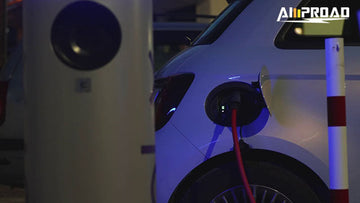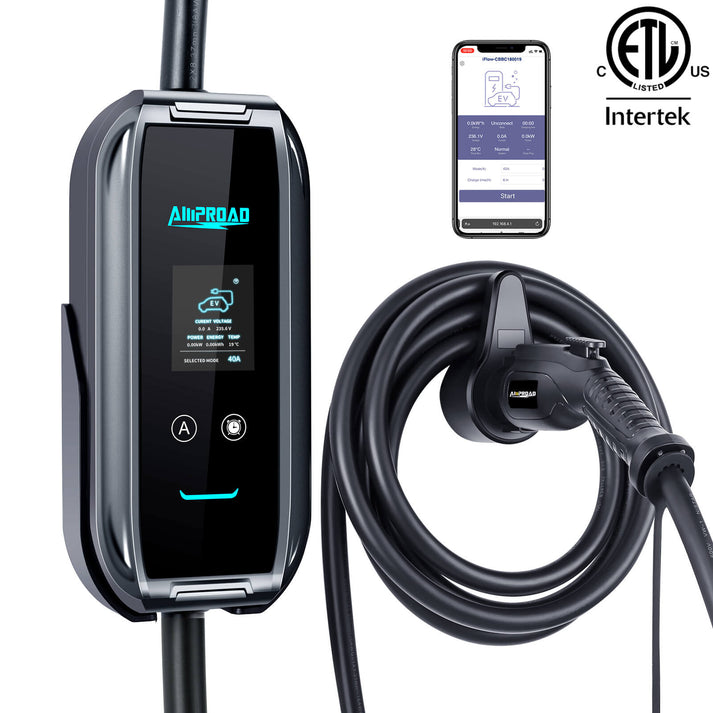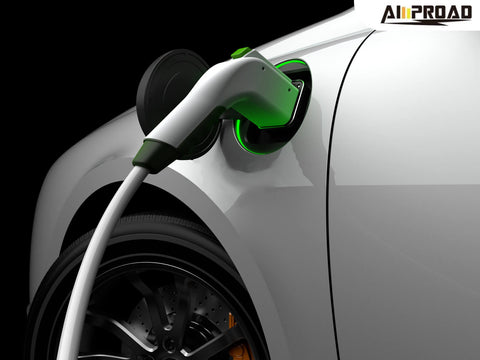
Charging your electric vehicle (EV) with a 220v outlet is indeed possible, but there are several factors to consider before plugging in. It’s important to understand your EV’s compatibility with this voltage, ensure your charger is suitable, and make sure your home setup can handle the required power. By taking the necessary steps, you can optimize your charging routine and benefit from faster charging times. Let’s dive into what you need to know to make the most of a 220v outlet for your EV.
Can You Charge an EV with a 220v Outlet?
A 220V outlet alone won’t charge most EVs directly—you’ll need a Level 2 charging station to make it work. Level 2 chargers, like AMPROAD’s high-quality etl certified iFlow P9 portable EVSE with adaptive voltage support, can be used to connect to 220V outlets and deliver faster, more efficient charging compared to Level 1 options. This makes them an ideal solution for reducing charging time and keeping your EV ready for the road.
For optimal performance and safety, it’s essential to have your 220V outlet and Level 2 charger professionally installed. Proper installation ensures the system operates efficiently while minimizing risks like electrical faults, giving you peace of mind as you charge your vehicle.

AMPROAD Portable EV charger with adjustable power and adaptive voltage makes perfect for home and travel EV charging!
Explore More Information
What is a 220v Outlet and How Does it Differ from Standard Outlets?
A 220-volt outlet, also known as a 240-volt outlet, is a type of electrical outlet commonly used for high-powered appliances such as electric dryers, ovens, and air conditioners. Unlike standard 120-volt outlets found in most homes, which have two vertical slots and a round grounding hole, a 220-volt outlet typically has four slots arranged in a different configuration. These outlets are designed to handle higher voltage and provide more power, making them suitable for charging electric vehicles (EVs) and powering heavy-duty machinery.
The main difference between a 220-volt outlet and a standard outlet lies in the voltage and current they deliver. While standard outlets supply 120 volts of alternating current (VAC), 220-volt outlets provide 220 to 240 volts, allowing them to deliver more power to compatible devices. This higher voltage is essential for charging EVs efficiently, as it enables faster charging times and ensures that the vehicle's battery receives an adequate amount of power to recharge fully.
Moreover, 220-volt outlets often have different configurations, such as NEMA 6-20 or NEMA 14-50, depending on their intended use. For EV charging, a NEMA 14-50 outlet is commonly used, providing both the voltage and current required for Level 2 charging. It's essential to consult a qualified electrician to install the appropriate outlet and ensure it meets safety standards. With a 220-volt outlet, EV owners can enjoy faster charging speeds and greater convenience when powering their vehicles at home or in other locations equipped with compatible charging infrastructure.
T the Amproad NEMA 14-50 plug charger stands out as a versatile and reliable option. Designed to be compatible with NEMA 14-50 outlets, this charger offers EV owners a convenient solution for home charging. With adjustable amp ratings, it can accommodate various charging needs, providing flexibility and efficiency. Its robust construction and safety features ensure reliable performance and peace of mind for users. By utilizing the Amproad NEMA 14-50 plug charger, EV owners can take advantage of Level 2 charging capabilities, significantly reducing charging times and enhancing the overall charging experience for their electric vehicles.

Are 220v Outlets Suitable for Charging Electric Vehicles?
When considering charging options for electric vehicles (EVs), many owners wonder if 220-volt outlets are suitable for their charging needs. The answer largely depends on the specific requirements of the EV and the available infrastructure. While 220-volt outlets can provide higher voltage than standard outlets, they may not always be the most optimal solution for EV charging.
In many cases, 220-volt outlets, also known as 240-volt outlets, are used for appliances like dryers, ovens, or air conditioners, rather than EV charging. However, with the right equipment, such as a Level 2 EV charger compatible with 220-volt outlets, they can be repurposed for EV charging. These chargers offer faster charging speeds compared to standard Level 1 chargers, making them a convenient option for EV owners looking to reduce charging times.
Before using a 220-volt outlet for EV charging, it's crucial to ensure that the outlet is properly installed and meets the electrical requirements for charging an EV safely. Additionally, consulting with a qualified electrician can help determine the feasibility and safety of using a 220-volt outlet for EV charging, ensuring a reliable and efficient charging experience for EV owners.
How Does Charging an EV with a 220v Outlet Compare to Other Charging Options?
Charging an electric vehicle (EV) with a 220-volt outlet offers several advantages compared to other charging options, but it also has its limitations. One of the primary benefits is the faster charging speed provided by a Level 2 EV charger connected to a 220-volt outlet. Level 2 charger typically delivers higher power output compared to standard Level 1 chargers, resulting in quicker charging times and greater convenience for EV owners.
Compared to using a standard 110-volt outlet, charging with a 220-volt outlet significantly reduces charging times, making it a more practical option for EV owners with higher daily driving requirements or those who prefer faster charging speeds. Additionally, 220-volt outlets are commonly found in residential settings, making them easily accessible for many EV owners without the need for extensive electrical upgrades.
However, charging an EV with a 220-volt outlet may not be as fast or convenient as using dedicated EV charging stations, such as public Level 2 charger including Tesla destination charger or DC fast chargers. These charging stations typically offer even higher power output and faster charging speeds, making them ideal for EV owners who need to charge their vehicles quickly while on the go or during long-distance travel. Additionally, dedicated EV charging stations often provide additional features and amenities, such as network connectivity and payment options, further enhancing the charging experience for EV owners.
What Equipment Do You Need to Charge an EV with a 220v Outlet?
To charge an electric vehicle (EV) with a 220-volt outlet, you'll need a Level 2 EV charging station. These charging stations are specifically designed to deliver higher power output compared to standard Level 1 chargers, allowing for faster and more efficient charging. Level 2 chargers typically come with a 220-volt plug, which is compatible with most residential electrical systems. Additionally, you may need to install a dedicated 220-volt circuit to support the increased power requirements of the charging station. This may involve hiring a qualified electrician to make the necessary electrical upgrades to your home's electrical panel and wiring.
In addition to the Level 2 charging station and electrical upgrades, you may also need to purchase a charging cable or connector that is compatible with your EV's charging port. Most EV manufacturers provide a charging cable with the vehicle, but you may need to purchase additional adapters or connectors depending on the type of charging station you have and the specific requirements of your EV. It's important to ensure that the charging cable and connectors you use are rated for the power output of the charging station and compatible with your EV to ensure safe and efficient charging.

Are There Any Limitations or Considerations to Keep in Mind When Using a 220v Outlet?
When using a 220-volt outlet to charge an electric vehicle (EV), there are several limitations and considerations to keep in mind. Firstly, the availability of 220-volt outlets may vary depending on your location and the infrastructure of your home. While many homes have 220-volt outlets for large appliances like dryers and ovens, not all residences may have access to these outlets, especially in older buildings or apartments. Therefore, you may need to install a dedicated 220-volt outlet or have one installed by a qualified electrician to enable EV charging at home.
Another consideration is the cost associated with installing a dedicated 220-volt outlet. Depending on the complexity of the installation and the existing electrical infrastructure, the cost of adding a new outlet or upgrading an existing one can vary. It's important to factor in these costs when budgeting for EV charging at home. Additionally, you may need to obtain permission from your landlord or homeowners' association before making any modifications to your home's electrical system.
Furthermore, the capacity of your home's electrical panel may also impact your ability to use a 220-volt outlet for EV charging. If your electrical panel is already near its capacity or if it's outdated, you may need to upgrade the panel to accommodate the additional load from the EV charger. This could add to the overall cost and complexity of installing a 220-volt outlet for EV charging. Therefore, it's advisable to consult with a qualified electrician to assess your home's electrical system and determine the feasibility of using a 220-volt outlet for EV charging.
Can You Install a 220v Outlet at Home for EV Charging?
Installing a 220-volt outlet at home for electric vehicle (EV) charging is indeed possible, but it requires careful planning and consideration. Firstly, you'll need to assess your home's electrical system to determine if it can support the additional load of an home EV charger. This may involve consulting with a qualified electrician to inspect your electrical panel and assess its capacity. If your electrical panel has sufficient capacity and is up to code, you can proceed with installing a 220-volt outlet.
The next step is to decide on the location for the outlet and the type of EV charger you want to install. Ideally, the outlet should be located near where you park your EV for convenient charging. There are different types of EV chargers available, including Level 2 chargers that require a 220-volt outlet. Once you've chosen the charger that best suits your needs, you can hire a licensed electrician to install the 220-volt outlet and EV charger.
It's important to note that installing a 220-volt outlet for EV charging may require obtaining permits and complying with local building codes and regulations. Additionally, the cost of installation can vary depending on factors such as the distance from the electrical panel to the charging location and any necessary upgrades to the electrical system. By working with a qualified electrician and obtaining the necessary permits, you can safely and efficiently install a 220-volt outlet at home for EV charging.


